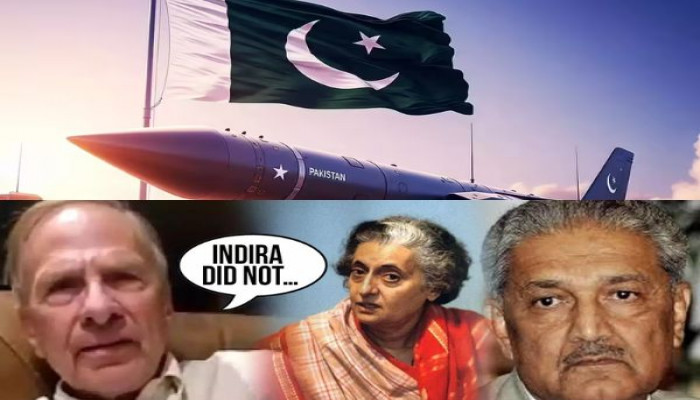‘Shame Indira didn’t approve’: Ex-CIA officer recounts India-Israel plan to strike Pak’s nuclear facility
- In Reports
- 06:21 PM, Nov 08, 2025
- Myind Staff
Former CIA officer Richard Barlow has criticised former Prime Minister Indira Gandhi for rejecting a secret India-Israel plan that proposed a preemptive strike on Pakistan’s Kahuta nuclear facility.
Calling it a lost opportunity, Barlow said that approving the plan in the early 1980s could have prevented several future problems. "Israel once offered to help India carry out a pre-emptive strike on Kahuta nuclear facility in Pakistan. It's a shame Indira didn't approve the plan ... It would have solved a lot of problems," he told news agency ANI.
Barlow, who served as a counterproliferation officer in the CIA during Pakistan’s secret nuclear program in the 1980s, said he had heard about the plan within intelligence circles though he was not personally involved in it.
"I was out of government from 1982 until 1985. And I think that may have occurred while I was out of government. I heard about it at some point. But I didn't get my teeth into it because it never happened. It's a shame that Indira didn't approve it," he added.
According to Barlow, the United States under President Ronald Reagan would have strongly opposed such an attack, especially one involving Israel, as it could have endangered America’s covert campaign against the Soviets in Afghanistan.
The India-Israel plan for a preemptive strike on Pakistan’s Kahuta nuclear plant was drawn up in the early 1980s amid fears that Pakistan was developing an ‘Islamic bomb’. After its successful airstrike on Iraq’s Osirak reactor in 1981, Israel viewed Pakistan’s nuclear ambitions as a serious threat to India, the region, and global security.
Reports said that Israel had offered to send its fighter jets, including F16s and F15s, to Indian airbases in Jamnagar and Udhampur. The plan was for Israeli aircraft to refuel mid-air from these bases while Indian Jaguar fighter jets provided support. The main goal was to destroy the Kahuta enrichment facility, which was still in the early stages of developing nuclear weapons technology.
Indira Gandhi had initially given her approval for the strike but later changed her mind due to the risks involved. She feared a massive Pakistani retaliation, a possible full-scale war, and pressure from powerful global allies, especially the United States, which was supporting Pakistan during the Afghan Soviet war.
Reports also suggested that the CIA had informed Pakistan about the plan, prompting it to strengthen security around Kahuta.
The assassination of Indira Gandhi in 1984 changed everything. Her son Rajiv Gandhi became Prime Minister and chose diplomacy over military action, which effectively ended the Kahuta strike plan.
In June, Assam Chief Minister Himanta Biswa Sarma accused the Congress of making a "historic blunder" by allowing Pakistan to become a nuclear power. He said Pakistan had used "nuclear blackmail" to prevent any international response.
In a social media post titled "Congress's Historic Blunder: How India Let Pakistan Become a Nuclear State," Sarma claimed that Israel had offered complete support, from intelligence inputs to joint strike planning. He said the Indian military was prepared for a preemptive strike from Jamnagar Air Base but "India had the capability and consensus to eliminate the threat before it became a reality. Yet at the last minute: Indira Gandhi hesitated, fearing international fallout," he alleged.
The Kahuta enrichment plant, developed under the supervision of Pakistani scientist AQ Khan, became the heart of Pakistan’s nuclear weapons program and led to its first nuclear tests in 1998.
"Pakistan's primary motive for developing nuclear weapons was to counter India. But it was also very clear from AQ Khan and the generals' perspective that it was not just the Pakistani bomb; it was the Islamic bomb, the Muslim bomb," Barlow said.
Born in 1936 in Bhopal, then part of undivided India, AQ Khan moved to Pakistan in 1952 after Partition. He later became known as one of the world’s most notorious nuclear smugglers, supplying sensitive technology to countries including North Korea, Iran, and Libya.







Comments